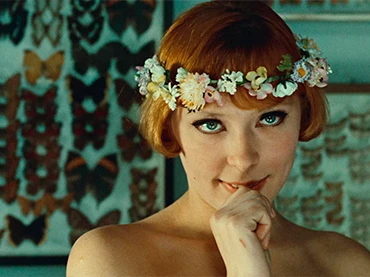
Held on 03 Nov 2022; 22 Mar 2023
Museo Reina Sofía presents a new edition of the anthological film series co- organized with the Filmoteca Española since 2016. This edition charts the work of thirty-four women filmmakers from fifteen Eastern European countries made between 1943 and 1993 and includes titles from such prominent figures as Věra Chytilová, Márta Mészáros, Evelyn Schmidt, and Binka Zhelyazkova, among others.
The number of films authored by Eastern European women between World War II and the collapse of the Soviet Union is limited, yet women’s stories throughout these years are innumerable. Encompassing a kaleidoscopic range of approaches—from absurdist satire to the formal adventurousness of the avant-garde—this series proves that filmmaking has long been an expression of resilience. These films not only provide glimpses into the lives of everyday women during this era, they also show the creative worlds women filmmakers inhabited, underscoring the audacity and sheer talent of artists who persevered in bringing their visions to life in the face of innumerable visible and invisible hurdles.
[dropdown]
The series is divided into three unique programs. The first, “Reconstructions and Reflections,” which takes place at the Cine Doré of the Filmoteca Española, features ten films that recount and reimagine personal and collective stories. Whether summoning the past or speculating on the future, each is an extension of the world and vision of its creator. Wanda Jakubowska and Wanda Bartówna’s The Last Stage (1948), for instance, echoes its filmmakers’ sense of alienation, while Ildikó Enyedi’s My 20th Century (1989) poses an alternative vision of the universe.
The second and third programs take place at the Museo Reina Sofía. In “Home and Everyday Realities,” the often brutal materiality of life under occupation is explored in both the private and public spheres. The final program, “Dreams and Imaginations,” considers the creative possibilities of escape. In addition to various feature-length films and two eclectic short-film showcases, the closing session features Maya Deren’s Meshes of the Afternoon (1943) and Chantal Akerman’s From the East (1993), two works by Jewish artists of Eastern European descent who draw attention to the paucity of Jewish on-screen storytelling during this period. As a special accompaniment to the series, the cellist Sonia Wieder-Atherton, who was Chantal Akerman’s collaborator and life partner, offers a unique concert featuring the Jewish music from Eastern Europe that provides rhythm to Akerman’s filmography.
This series offers a constellation of films depicting life across countries, regions, time periods, and social classes. It does not purport to speak to the entirety of women’s individual and collective experiences during these years and includes but a tiny fraction of the stories from this moment in history. These tales of victory, love, loss, and terror are merely ripples of our shared survival.
[/dropdown]
Curated by
Dorota Lech
Organised by
Museo Reina Sofía and Filmoteca Española
Acknowledgments
Beatrice Loayza, B. Ruby Rich, K.J. Relth-Miller, Steve Macfarlane, Veton Nurkollari, Călin Boto, Maria Popova, and Sonora Broka
-
Thursday, 3 November 2022 – 8:30pm / Second session: Saturday, 3 December 2022 – 7:30pm Filmoteca Española, Cine Doré
Session 1
Wanda Jakubowska y Wanda Bartówna. Ostatni etap (The Last Stage)
Poland, 1948, b/w, Polish with Spanish subtitles, DCP restoration, 110’―Presented by Chema González, head of the Museo Reina Sofía’s Cultural and Audiovisual Activities; Dorota Lech (by video), series curator; and Carlos Reviriego, deputy director and head of programming of the Filmoteca Española.
On April 28, 1943, Wanda Jakubowska—who was nominated for an Academy Award in 1933 before her arrest and imprisonment— was transported by train from Warsaw to Auschwitz. Having survived the camps, she looked to the then recent past in her monumental 1948 film The Last Stage, which she co-directed with Wanda Bartówna. Shot on location at Auschwitz and co-written with Gerda Schneider, a political prisoner who became a Blockälteste (Kapo) whom Jakubowska befriended in the camp, the film is based on the true story of Mala Zimetbaum, a multilingual Polish Jew who was forced to work as a translator after attracting the guards’ attention. As witnesses to the brutality of the Third Reich, the filmmakers were uniquely positioned to preserve its horrors in this heart-wrenching drama of pathos and symbolism.
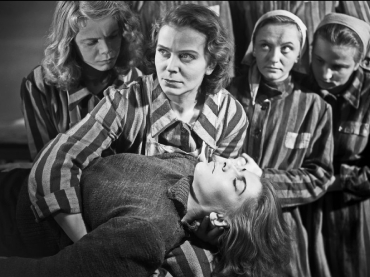
-
Friday, 4 November 2022 Filmoteca Española, Cine Doré
Session 2
Kira Muratova. Korotkie vstrechi (Brief Encounters)
USSR, 1967, b/w, Russian with Spanish subtitles, 35mm, 91’In Kira Muratova’s deeply moving Brief Encounters (1967), Muratova plays Valentina, a Ukrainian city councilor imprisoned by the conventions and behaviors deemed essential for a model Soviet citizen. Her charming geologist husband, Maksim, periodically abandons her for the field, where he meets Nadia, a young waitress. Nadia travels to the city and ends up working for Valentina and Maksim as a housekeeper. Soon, the two women’s stories begin to overlap, revealing their emotional complexes and distinct forms of disaffection. Muratova was notorious for her sharp morality and nihilistic worldview, and Brief Encounters, like most films that seemed to criticize the system, was banned until perestroika. Though the film mocks a kind of utopian love, it ultimately reveals an astute understanding of the relationship between work and home.
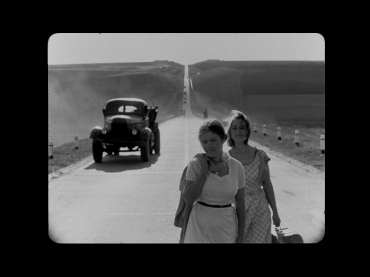
-
Sunday, 6 November 2022 – 9pm / Second session: Sunday, 11 December 2022 – 6pm Filmoteca Española, Cine Doré
Session 3
Barbara Sass. Bez miłośc
Poland, 1980, color, Polish with Spanish subtitles, DCP, 99’In Barbara Sass’s psychological drama Without Love (1980), we meet Ewa Bracka, a single parent raising her illegitimate daughter with the help of her mother. Though she is in a difficult social situation, Ewa is also a gutsy journalist who could care less about gender norms. Unscrupulous and determined to make her mark, she pops pills as she moves up the professional ladder by any means necessary, even by sleeping with editors. When things go awry, Ewa must confront her own actions after betraying Marianna, a young provincial woman she befriends, who arrives in Warsaw and ends up working in a brothel. Featuring the great Dorota Stalińska, who also stars in Debutante (1982) and Scream (1983), both also by Barbara Sass, Without Love is, besides being Sass’s most essential work, the start of the collaboration between the two women.
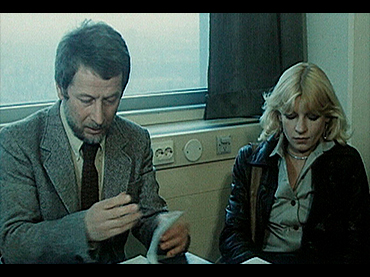
-
Friday, 11 November 2022 Filmoteca Española, Cine Doré
Session 4
Ada Neretniece. Tava laime (Your Happiness)
Latvia, 1960, b/w, Latvian with Spanish subtitles, DCP, 75’In Ada Neretniece’s Your Happiness (1960), Velta, a bureaucrat working on the renovation of a shipyard that could have a substantial effect on productivity, must decide between developing a relationship with the man who proposed the project… or with the man who advocates sabotaging it. Full of characters and scenes from everyday life, the film illuminates what existence must have felt like for average citizens during these years of Latvian history. Neretniece’s central characters struggle with balancing the public and private spheres of their lives, and the film provides a rare look into the kinds of dilemmas that working women face—in this case, the propagandistic motivation of what the state considers right.
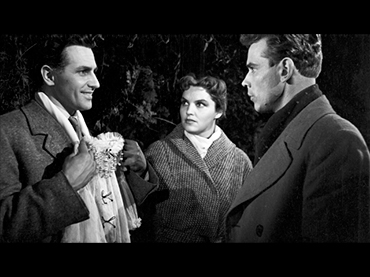
-
Saturday, 12 November 2022 – 9pm / Second session: Saturday, 4 December 2022 – 6pm Filmoteca Española, Cine Doré
Session 5
Ildikó Enyedi. Az én XX. századom (My 20th Century)
Hungary, 1989, b/w, Hungarian with Spanish subtitles, DCP, 102’―Video presentation by Ildikó Enyedi
Ildikó Enyedi’s 1989 debut, My 20th Century, looks to the future through the lens of the past, leading us out of the cave with the light of cinema. The twins Dóra and Lili, orphaned and poor, are forced to follow opposite directions out of childhood. While one becomes a grifter who wishes to sustain her luxurious lifestyle, the other is an anarchist plotting revolution. Cutting across space and time, and sprinkled with irony and symbolism, the film muses on the origins of modernity and cinema—phenomena indebted to electricity. Our twentieth century was undoubtedly filled with paradoxes, and we, like the dog in the Pavlovian experiment we see in the film, knew very little of the universe beyond our own laboratory.
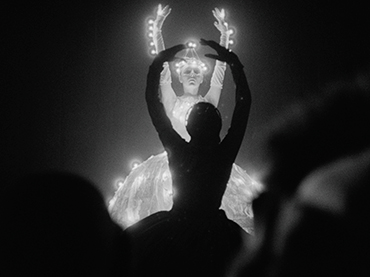
-
Wednesday, November 16, 2022 – 9:30pm / Second session: Friday, 16 December 2022 – 7:30pm Filmoteca Española, Cine Doré
Session 6
Xhanfise Keko. Kur po xhirohej një film (While Shooting a Film)
Albania, 1981, color, Albanian with Spanish subtitles, DCP, 61’Xhanfise Keko’s While Shooting a Film (1981) tackles the rarely explored topic of divorce, a theme then considered taboo due to the negative image it could reveal of socialist societies. A film within a film, the story centers on Genc, an emotionally distraught child actor shooting a period movie on location in a small Albanian town. Genc’s parents have recently separated, causing his emotional world to turn upside down. Caught up in memories of his previously happy childhood, Genc is trapped in the middle of his parents’ feud when the two reunite in the studio and are forced to confront each other as well as their son’s distressed state. Meanwhile, Genc dreams of them getting back together. During the 1970s and 1980s, the director filmed eleven features that often showed the lives and perspectives of children.
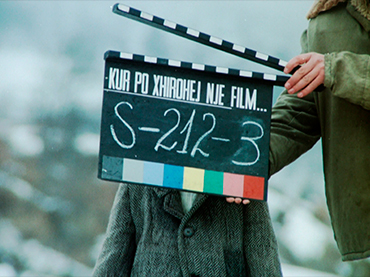
-
Friday, 18 November 2022 – 9pm / Second session: Sunday, 18 December 2022 – 7pm Filmoteca Española, Cine Doré
Session 7
Lana Gogoberidze. Dges game utenebia (Day Is Longer Than Night)
Georgia, 1984, color, Georgian with Spanish subtitles, DCP, 138’Lana Goggoberidze’s Day Is Longer Than Night (1984) takes the viewer to a forgotten time. Eva has known love, life, and men, and has been betrayed by all three. Her eighty years of life in a Georgian village are marked by a tragic marriage, another unhappy one, and the progressive abandonment of rural life for the city, as well as by the revolution, the country’s civil war, the Soviet New Economic Policy, and the arduous collectivization process. Goggoberidze, whose mother was one of the USSR’s first credited female directors before falling victim to one of Stalin’s purges, delves relentlessly into Eva’s dissatisfaction. Her suffering takes place against the backdrop of the natural beauty of the Georgian mountains, with bursts of traditional music and dance that make this film one of Goggoberidze’s most imaginative and poignant works.
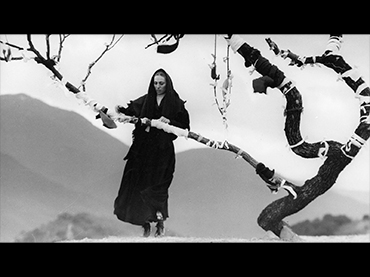
-
Sunday, 20 November 2022 – 5pm / Second session: Saturday, 10 December 2022 – 7:30pm Filmoteca Española, Cine Doré
Session 8
Drahomíra Vihanová. Zabitá neděle (Squandered Sunday)
Czechoslovakia, 1984, b/w, Czech with Spanish subtitles, DCP, 78’Made shortly after Czechoslovakia’s Prague Spring was violently suppressed, Squandered Sunday, Drahomíra Vihanová’s somber and defiant 1969 debut, resulted in restrictions on the artist’s filmmaking activities until 1977 and the banning of the film until 1990. After a night of drinking, a disillusioned soldier named Arnošt wakes up in the bare-bones military barracks in which lives and nurses his hangover while meditating on his past decisions and considering his grim reality. In contrast with the futility of his present state, Arnošt’s sparkling nostalgia guides him down memory lane, where he encounters a succession of characters from his former life—and realizes the extent of everything he has lost. Vihanová’s sharp and energetic manipulation of time leads us to ponder the life before us, like a patient on an operating table, encouraging us to venture conclusions about the hero’s state of mind, tumultuous journey, and precarious place in the world.
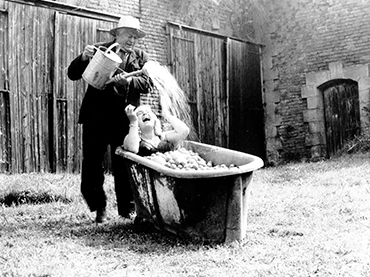
-
Tuesday, 22 November 2022 – 8:30pm / Second session: Wednesday, 21 December 2022 – 5:30pm Filmoteca Española, Cine Doré
Session 9
Leida Laius. Varastatud kohtumine (Stolen Meeting)
Estonia, 1989, color, Estonian with Spanish subtitles, 35mm, 97’Leila Laius’s final film, Stolen Meeting (1989), begins in a Soviet prison camp in Russia, from where Valentina, who was orphaned at a young age and knows nothing about her own parents, returns to Estonia and immediately begins to search for her son, Jüri, whom she surrendered to an orphanage at birth. When she finds out that Jüri was adopted by a well-off couple, she must decide what is best for her child. The film’s poignant script was penned by Russian playwright Maria Zvereva and expertly directed by Laius, who, due to her own personal history, spent her career making both documentary and fiction films that explore themes of motherhood and home. Stolen Meeting peels back the layers of tragedy that pervaded the lives of so many women during the years of Soviet occupation.
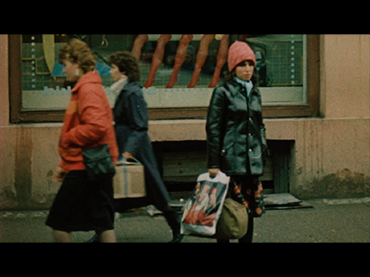
-
Wednesday, 23 November 2022 – 8pm / Second session: Friday, 2 December 2022 – 7pm Filmoteca Española, Cine Doré
Session 10
Malvina Urșianu. Gioconda fără surâs (The Mona Lisa Without a Smile)
Romania, 1968, b/w, Romanian with Spanish subtitles DCP, 92’—Presented by Dorota Lech, series curator
After being politically persecuted, imprisoned, and banned from working in the film industry for a decade, Malvina Urșianu wrote and directed The Mona Lisa Without a Smile, her first feature, in 1968. Three former classmates meet and remember the years they spent together, settling old scores and creating new ones. Seen today as a subtle critique of the Ceaușescu regime, Urșianu, whose work is considered a cornerstone of Romanian modernist cinema, explores the infrequently discussed issue of class differences within socialist societies.
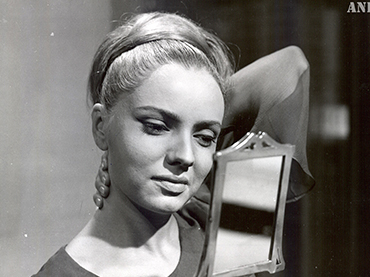
-
Wednesday, 7 December 2022 – 7 pm / Second session: Friday, 14 January 2023 – 7pm Museo Reina Sofía, Sabatini Building, Auditorium
Session 1
TicketsLarisa Shepitko. Krylya (Wings)
USSR, 1966, b/w, Russian with Spanish subtitles, DA, 85’Larisa Shepitko was born in Bakhmut, Ukraine, in 1938, at the height of Stalin’s Great Terror and not long after the Holodomor genocide, a man-made famine in the context of collectivization from 1932 to 1933 that ravaged Shepitko’s homeland and killed millions of Ukrainians. In her debut film, Wings, the protagonist, Nadezhda Petrukhina, is a decorated Soviet fighter pilot resigned to civilian life as a school principal. Though she describes herself as “provincial, unsophisticated, and gruff,” she is revered by her peers and strives to connect with the new generation—her entitled students and her adopted daughter, who is unaware of her origins. Nadezhda is unable to adjust to her claustrophobic life during peacetime, and we see her memories of freedom in the sky woven into her daily routine. Shepitko’s naturalistic gaze and stark depiction of the soon-to-be-forgotten hero’s monotonous days packs a realistic punch for modern viewers, particularly in the context of Russia’s ongoing war in Ukraine.
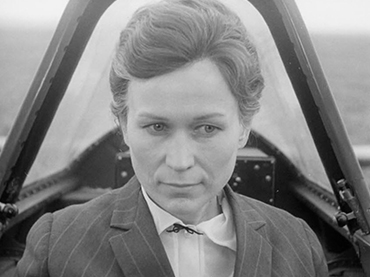
-
Friday, 9 December 2022 – 7pm / Second session: Friday, 20 January 2023 – 7pm Museo Reina Sofía, Sabatini Building, Auditorium
Session 2
TicketsYuliya Solntseva. Nezabyvaemoe (The Unforgettable)
USSR, 1967, b/w, Russian with Spanish subtitles, DA, 118’After becoming the first female winner of the Best Director Award at the Cannes Film Festival for Chronicle of Flaming Years (1960), Yuliya Solntseva made The Unforgettable (1967). The film centers on one unlucky family during the early years of World War II. It opens with a young woman who, fearing death in the wake of the Nazi invasion, asks a handsome Red Army soldier to spend the night with her. The pair find love, but war is close behind and the relentless German invasion brings countless woes and horrors to the family and the region, experiences made visceral and tense through the lens of Solntseva’s camera and her masterful composition of wide-screen images.
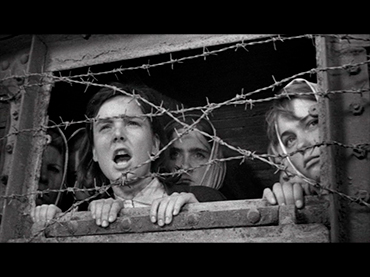
-
Saturday, 10 December 2022 – 7pm / Second session: Saturday, 21 January 2023 – 7pm Museo Reina Sofía, Sabatini Building, Auditorium
Session 3
TicketsMárta Mészáros. Örökbefogadás (Adoption)
Hungary, 1975, b/w, Hungarian with Spanish subtitles, DA, 84’Márta Mészáros was the first woman to win the Berlinale’s Golden Bear for her drama Adoption (1975). The film tells the story of Kata, an unmarried yet self-assured forty-three-year-old factory worker who is having an affair with a married father of two named Joska. Unwavering, Jasko refuses to give Kata a child, which she deeply desires. Soon, she befriends a runaway named Anna, who herself is involved in an illicit affair and needs Kata’s help. By entangling herself in the young woman’s problems, Kata is motivated to reexamine her own emotional wounds, inspiring her to adopt a child of her own. Shot with meticulous detail and care, this powerful film gives exceptional insight into the conditions of daily life for married, unmarried, child-bearing, and childless mothers alike, illuminating their shared bonds.
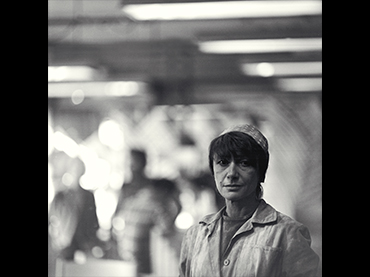
-
Thursday, 15 December 2022 – 7pm / Second session: Thursday, 26 January 2023 – 7pm Museo Reina Sofía, Sabatini Building, Auditorium
Session 4
TicketsIris Gusner. Alle meine Mädchen (All of My Girls)
East Germany, 1980, color, German with Spanish subtitles, DA, 83’. New restored versionIris Gusner’s All of My Girls (1980) focuses on Ralf, a film student who is making a documentary about an all-women work brigade inside NARVA, East Germany’s state-run lightbulb factory. The collective, including Marie, a no-nonsense supervisor, and Kerstin, who is on a probationary period and the only woman with a secondary degree, appears to be a relatively cohesive group. But tensions arise, and Ralf is quickly drawn into the fold. News that the brigade will be disbanded reaches the workers, who accuse Marie of withholding the information, leading to the revelation that she’s been closely monitoring each worker’s time cards. Shot on location in the real NARVA plant in Berlin and delicately attuned to each woman’s personality and role within the brigade, Gusner’s feature is an honest portrait of the lives of working women in the GDR.

-
Friday, 16 December 2022 – 7pm / Second session: Friday, 27 January 2023 – 7pm Museo Reina Sofía, Sabatini Building, Auditorium
Session 5
TicketsEvelyn Schmidt. Das Fahrrad (The Bicycle)
East Germany, 1982, color, German with Spanish subtitles, DA, 89Made in 1980, Evelyn Schmidt’s The Bicycle depicts Susanne, a single mother and an unskilled worker who operates a punch press in a factory. Though Susanne is a loving parent, her need to pay the bills sometimes takes a back seat to her love of drinking. Shortly after leaving her uninspiring job, she meets an eligible bachelor and engineer named Thomas, a successful man who nevertheless has his own work issues. Desperate to make ends meet, she takes bad advice and reports her bicycle missing to collect the insurance money, resulting in an altercation with the law when she’s caught riding the “stolen” vehicle. Initially unaware of the crime, Thomas stands by Susanne, but cannot understand her choices when the truth is revealed. Schmidt discerningly probes the circumstances of a woman who, like many others, lacks options, making The Bicycle a key film in the socialist cinema canon. Initially frowned upon due to its depiction of an East German women’s lackluster life and the hardships of women in socialist society, the film, though allowed to screen nationally, was prohibited from being presented at international film festivals.

-
Saturday, 17 December 2022 – 7pm / Second session: Saturday, 28 January 2023 – 7pm Museo Reina Sofía, Sabatini Building, Auditorium
Session 1
TicketsBinka Zhelyazkova. Privarzaniyat balon (The Tied-Up Balloon)
Bulgaria, 1967, b/w, Bulgarian with Spanish subtitles, DA, 98’Binka Zhelyazkova’s satirical comedy The Tied-Up Balloon (1967), based on Yordan Radichkov’s magical-realist novel of the same name, is the director’s most visually scintillating and politically daring work. During World War II, on a day like any other, an enormous goldfish-shaped balloon suddenly appears above the Bulgarian countryside, grabbing the attention of the peasants. What it symbolizes and where it’s going is anyone’s guess, but no one can look away. Like the Pied Piper, it gestures toward a path whose direction is unknown, mesmerizing the villagers with its relentless sense of freedom. The possibilities are endless until a policeman arrives, and the dreams of freedom deflate, literally. Following the film’s premiere, the central authority immediately banned it due to its rugged depiction of life in Bulgarian villages as well as its subtle hints about the origins of many of the state’s communist leaders.
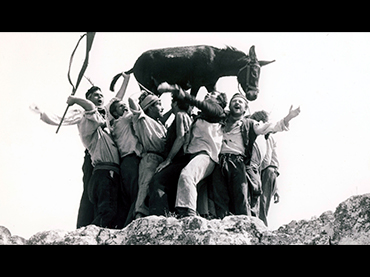
-
Tuesday, 20 December 2022 Museo Reina Sofía, Nouvel Building, Auditorium 200
Session 2
TicketsSonia Wieder-Atherton’s Concert Tribute to Chantal Akerman
The renowned interpreter and composer Sonia Wieder-Atherton offers this special concert for cello in which she invokes the music of Eastern Europe that permeates Chantal Akerman’s filmography. Life partner and collaborator of the filmmaker, the cellist worked with Akerman on the music for a great number of her films, such as From the East or American Stories: Food, Family and Philosophy; but she also was a protagonist in Akerman’s musical films, such as Franz Schubert’s Last Three Sonatas or Three Stanzas on the Name Sacher, in which the music and her interpretation serve to compose an intimate and devout portrait of the loved one. For this concert, Sonia Wieder-Atherton has revisited Chantal Akerman’s filmography and selected the musical compositions that best communicate uprootedness and loss, alluding not only to the displaced Jewish identity but also to the feeling of absence of the filmmaker and partner.
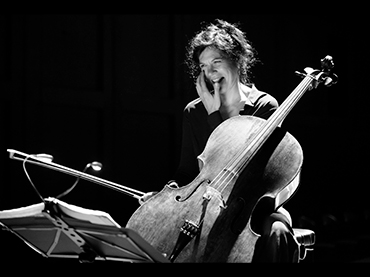
-
Thursday, 22 December 2022 – 7pm / Second session: Friday, 3 February 2023 – 7pm Museo Reina Sofía, Sabatini Building, Auditorium
Session 3
TicketsVěra Chytilová. Sedmikrásky (Daisies)
Czechoslovakia, 1966, b/w, color, Czech with Spanish subtitles, DA, 76’Věra Chytilová’s second film, the absurdist, formally vibrant, and aesthetically riveting Daisies (1966) was an instant cult classic, making of its director an enfant terrible of the Czechoslovak New Wave. Premiering two years before the 1968 Prague Spring, the film follows the misadventures of two young women named Marie I and Marie II (embodied by nonprofessional actresses Jitka Cerhová and Ivana Karbanová), who rebel against their positions in the world by precociously mirroring their indulgent surroundings and by causing a ruckus in every space they enter. In their world, nothing traditional is sacred, while food, clothes, men, and war become both ammunition and the victims of their provocative pranks. This timeless gem of feminist cinema is a surrealist fever dream that never fails to remind audiences about the possibilities of creativity born from the darkest of times.
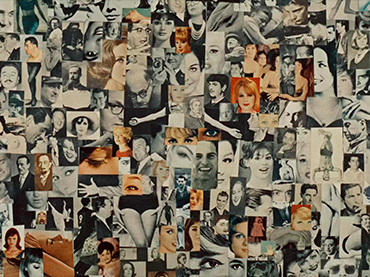
-
Friday, 23 December 2022 – 7pm / Second session: Saturday, 4 February 2023 – 7pm Museo Reina Sofía, Sabatini Building, Auditorium
Session 4
TicketsVěra Chytilová. Pytel blech (A Bagful of Fleas)
Czechoslovakia, 1962, b/w, Czech with Spanish subtitles, DA, 43’A cinema-vérité drama that exemplifies director Věra Chytilová's trademark use of non-diegetic sound, A Bagful of Fleas (1962) follows a group of teenage girls who work in a textile factory and live in a shared dormitory. Played by nonprofessional actors, Božka, Miládka, Jana, Alena, Máňal, and the new girl Eva are bound to their material surroundings yet sparkle with a sense of rebellion. Primarily told through the eyes of Eva, the film sees the girls struggle with and defy the restrictions placed upon them. A critical chapter in Chytilová’s body of work—and a follow-up to Ceiling (1961), another exploration of girlhood and feminine maturation in communist Czechoslovakia—A Bagful of Fleas is a precursor to her explosive masterwork, Daisies (1966), and to the forms of liberation—cinematic, political, and otherwise—on the horizon.
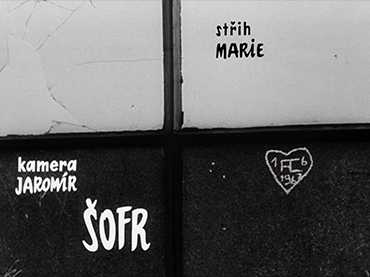
-
Thursday, 12 January 2023 – 7pm / Second session: Thursday, 9 February 2023 – 7pm Museo Reina Sofía, Sabatini Building, Auditorium
Session 5. Shorts Programme 1
TicketsElisabeta Bostan. Hora
Romania, 1959, b/w, Romanian with Spanish subtitles, DA, 9’Elisabeta Bostan. Pupăza din tei (The Hoopoe on the Lime Tree)
Romania, 1965, b/w, Romanian with Spanish subtitles, DA, 11’Roze Stiebra. Kabata (In My Pocket)
Latvia, 1983, color, Latvian with Spanish subtitles, DA, 8’Nijolė Valadkevičiūtė. Rytoj, 11 val. ryto (Tomorrow at 11am)
Lithuania 1985, color, Lithuanian with Spanish subtitles, DA, 10’Laila Pakalniņa. Veļa (The Linen)
Lithuania, 1991, b/w, Lithuanian with Spanish subtitles, DA, 10’With styles ranging from documentary to animation yet presented chronologically, this diverse program of short films gathers a group of filmmakers from countries including Romania, Croatia, Latvia, and Lithuania. Elisabeta Bostan’s skillful animation of real-life and fictional characters includes the subjects of Theodor Aman’s and Nicolae Grigorescu’s paintings in Hora (1959) as well as Ion Creanga’s short-story “lime hoopoe” in The Hoopoe on the Lime Tree (1965), while Roze Stiebra’s In My Pocket (1983) chronicles the colorful and musical adventures of animals though the countryside. For her part, Nijole Valadkeviciute’s formally and narratively surprising Tomorrow at 11am (1985) highlights her abstract approaches while pointing to the range of styles from the region. Exploring the everyday, Ljiljana Jojic’s Medvidica (1977) dramatizes life in a coastal town, while Laila Pakalnina’s documentary The Linen (1991) depicts the monotonous daily life of a truck driver making linen deliveries as life unfolds around him. Distinct in form, collectively these works provide insight into the creative ranges of these artists, with each work serving as a testament to the author’s audacity and perseverance in the face of innumerable visible and invisible hurdles.

-
Friday, 13 January 2023 – 7pm / Second session: Friday, 10 February 2023 – 7pm Museo Reina Sofía, Sabatini Building, Auditorium
Session 6. Shorts Programme 2: Experimental
TicketsErna Banovac. Erna
Yugoslavia, 1963, b/w, Serbo-Croatian with Spanish subtitles, DA, 2’Ewa Partum. Poezja Aktywna. Wiersz Ewa (Active Poetry. Poem by Ewa)
Poland, 1971–73, b/w, sound, DA, 6’Bojana Vujanović. Putovanje (The Journey)
Yugoslavia, 1972, color, Serbo-Croatian with Spanish subtitles, DA, 2’Tatjana Ivančić. Igra života (The Play of Life)
Yugoslavia, 1972, color, Serbo-Croatian with Spanish subtitles, DA, 4’Helena Włodarczyk. Ślad (Trace)
1976, Poland, b/w, sound, DA, 13’Geta Brătescu. Les Mains. Pentru ochi, mâna trupului meu îmi reconstituie portretul (Hands. For the Eye, the Hand of My Body Draws My Portrait)
1977, Romania, b/w, sound, DA, 6’Wanda Mihuleac. Panta Rei
1975, Romania, b/w, sound, DA, 10’Sanja Iveković. Osobni rezovi (Personal Cuts)
1982, Yugoslavia, color, sound, DA, 4’Teresa Tyszkiewicz. ARTA
1984, Polonia, color, sonido, AD, 6’Ildikó Enyedi. Flirt: Hipnózis (Flirt: Hypnosis)
1984, Poland, color, Polish with Spanish subtitles, DA, 6’Presented chronologically, this eclectic program of experimental short films gathers a group of interdisciplinary artists from countries including Croatia, Poland, Serbia, Romania, and Hungary. The program includes Erna Banovac’s Erna (1963), Ewa Partum’s Active Poetry. Poem by Ewa (1971–73), and Wanda Mihuleac’s Panta Rei (1975), films that uniquely address the issue of ecology through a variety of prisms. In contrast, the metropolis, with its mechanical interiors and exteriors, fills the frames of Bojana Vujanović’s The Journey (1972) and Tatjana Ivančić’s The Play of Life (1972). Meanwhile, the body—sometimes sculpted, multidimensional, metaphoric, life-giving, and malleable—is the focus of Helena Włodarczyk’s Trace (1976), Geta Brătescu’s Hands. For the Eye, the Hand of My Body Draws My Portrait (1977), Sanja Iveković’s Personal Cuts (1982), Teresa Tyszkiewicz’s ARTA (1984/2019), and Ildikó Enyedi’s Flirt: Hypnosis (1979). Shot on Super 8, 8mm, or 16mm and later digitized, they collectively exemplify the mutuality and complex layering of the experimental avant-gardes that reflected on the environmental—including the confines and liberties of the body—while projecting to the outside an endless creativity, and thereby surpassing the borders of the state.

-
Wednesday, 22 March 2023 Museo Reina Sofía, Sabatini Building, Auditorium
Session 7. Closing Session
TicketsMaya Deren y Alexander Hammid. Meshes of the Afternoon
USA, 1943, b/w, DA, 14’Chantal Akerman. D’Est (From the East)
Belgium, France, Portugal, 1993, color, sound, DA, 107’. Restored version by Cinematek of BelgiumBorn into a Jewish family in Kyiv, Eleanora Derenkowska, also known as Maya Deren, fled Soviet Ukraine in 1922 when she was four years old as a result of antisemitic pogroms. A keystone of experimental film, Deren was a pioneer of personal and independent cinema who drew from her own history and demonstrated a deep interest in socialism throughout her youth. Shot on a 16mm Bolex camera, Meshes of the Afternoon (1943) is her best-known work and is considered one of the most important contributions to avant-garde cinema. Suffused with symbolism and repetition as it shifts perspective from the first to the third person, Deren’s ephemeral work conveys the experience of a woman through a prism of multiple interpretations. Shortly after the collapse of the Soviet Union, Chantal Akerman set her gaze to the East, to the lands of her ancestors. Described by the filmmaker as “documentary bordering on fiction,” the film traverses former East Germany, Poland—the land in which both her parents braved the horrors of the Holocaust—and the Baltics, before reaching Moscow at the tail end of summer and into the depths of winter. Moving between long, steady tracking shots, Akerman observes and seizes this fleeting period of transition with the heart of an exile who is finally making her homecoming.

Más actividades

Difficulty. Forms and Political Effects of Deviation in Writing and Contemporary Art
23 February – 14 December 2026 – Check programme
Difficulty. Forms and Political Effects of Deviation in Writing and Contemporary Art is a study group aligned towards thinking about how certain contemporary artistic and cultural practices resist the referentiality that dominates the logics of production and the consumption of present-day art. At the centre of this proposal are the concepts of difficulty and deviation, under which it brings together any procedure capable of preventing artistic forms from being absorbed by a meaning that appears previous to and independent from its expression. By ensuring the perceptibility of their languages, difficulty invites us to think of meaning as the effect of a signifying tension; that is, as a productive and creative activity which, from the materiality of art objects, frees aesthetic experience from the representational mandate and those who participate in it from the passiveness associated with tasks of mimesis and decoding.
The economy of the referential norm translates the social logic of capitalism, where insidious forms of capturing subjectivity and meaning operate. In the early 1980s, and adopting a Marxist framework, poet Ron Silliman highlighted how this logic entailed separating language from any mark, gesture, script, form or syntax that might link it to the conditions of its production, rendering it fetichised (as if without a subject) and alienating its users in a use for which they are not responsible. This double dispossession encodes the political strategy of referential objectivity: with no subject and no trace of its own consistency, language is merely an object, that reality in which it disappears.
The political uses of referentiality, more sophisticated today than ever before, sustain the neoliberal-extractivist phase of capitalism that crosses through present-day societies politically, economically and aesthetically. Against them, fugitive artistic practices emerge which, drawing from Black and Queer studies and other subaltern critical positions, reject the objective limits of what exists, invent forms to name what lies outside what has already been named, and return to subjects the capacity to participate in processes of emission and interpretation.
Read from the standpoint of artistic work, the objective capture of referentiality may be called transparency. Viewed from a social contract that reproduces inequality in fixed identity positions, transparent in this objectivity are, precisely, the discourses that maintain the status quo of domination. Opposite the inferno of these discourses, this group aims to collectively explore, through deviant or fugitive works, the paradise of language that Monique Wittig encountered in the estranged practices of literature. For the political potency of difficulty — that is, its contribution to the utopia of a free language among equals — depends on making visible, first, its own deviations; from there, the norm that those deviations transgress; and finally, the narrowness of a norm which in no way exhausts the possibilities ofsaying, signifying, referring and producing a world.
From this denouncement of referential alienation, fetishisation and capture, Difficulty. Forms and Political Effects of Deviation in Writing and Contemporary Art turns its attention to the strategies of resistance deployed by contemporary artists and poets. Its interest is directed towards proposals as evidently difficult or evasive as those of Gertrude Stein, Lyn Hejinian, Theresa Hak Kyung Cha, Kameelah Janan Rasheed, Kathy Acker, María Salgado and Ricardo Carreira, and as seemingly simple as those of Fernanda Laguna, Felix Gonzalez Torres and Cecilia Vicuña, among other examples that can be added according to the desires and dynamics of the group.
The ten study group sessions, held between February and December, combine theoretical seminars, work with artworks from the Museo Reina Sofía’s Collections and exhibitions, reading workshops and public programs. All these formats serve as spaces of encounter to think commonly about certain problems of poetics — that is, certain political questions — of contemporary writing and art.
Difficulty. Forms and Political Effects of Deviation in Writing and Contemporary Art inaugurates the research line Goodbye, Representation, through which the Museo Reina Sofía’s Studies Directorship seeks to explore the emergence of contemporary artistic and cultural practices which move away from representation as a dominant aesthetic-political strategy and redirect their attention toward artistic languages that question the tendency to point, name and fix, advocating instead for fugitive aesthetics. Over its three-year duration, this research line materializes in study groups, seminars, screenings and other forms of public programming.

Institutional Decentralisation
Thursday, 21 May 2026 – 5:30pm
This series is organised by equipoMotor, a group of teenagers, young people and older people who have participated in the Museo Reina Sofía’s previous community education projects, and is structured around four themed blocks that pivot on the monstrous.
This fourth and final session centres on films that take the museum away from its axis and make it gaze from the edges. Pieces that work with that which is normally left out: peripheral territories, unpolished aesthetics, clumsy gestures full of intent. Instead of possessing an institutional lustre, here they are rough, precarious and strange in appearance, legitimate forms of making and showing culture. The idea is to think about what happens when central authority is displaced, when the ugly and the uncomfortable are not hidden, when they are recognised as part of the commons. Film that does not seek to be to one’s liking, but to open space and allow other ways of seeing and inhabiting the museum to enter stage.

Intergenerationality
Thursday, 9 April 2026 – 5:30pm
This series is organised by equipoMotor, a group of teenagers, young people and older people who have participated in the Museo Reina Sofía’s previous community education projects, and is structured around four themed blocks that pivot on the monstrous.
The third session gazes at film as a place from which to dismantle the idea of one sole history and one sole time. From a decolonial and queer perspective, it explores films which break the straight line of past-present-future, which mix memories, slow progress and leave space for rhythms which customarily make no room for official accounts. Here the images open cracks through which bodies, voices and affects appear, disrupting archive and questioning who narrates, and from where and for whom. The proposal is at once simple and ambitious: use film to imagine other modes of remembering, belonging and projecting futures we have not yet been able to live.

Remedios Zafra
Thursday March 19, 2026 - 19:00 h
The José Luis Brea Chair, dedicated to reflecting on the image and the epistemology of visuality in contemporary culture, opens its program with an inaugural lecture by essayist and thinker Remedios Zafra.
“That the contemporary antifeminist upsurge is constructed as an anti-intellectual drive is no coincidence; the two feed into one another. To advance a reactionary discourse that defends inequality, it is necessary to challenge gender studies and gender-equality policies, but also to devalue the very foundations of knowledge in which these have been most intensely developed over recent decades—while also undermining their institutional support: universities, art and research centers, and academic culture.
Feminism has been deeply linked to the affirmation of the most committed humanist thought. Periods of enlightenment and moments of transition toward more just social forms—sustained by education—have been when feminist demands have emerged most strongly. Awareness and achievements in equality increase when education plays a leading social role; thus, devaluing intellectual work also contributes to harming feminism, and vice versa, insofar as the bond between knowledge and feminism is not only conceptual and historical, but also intimate and political.
Today, antifeminism is used globally as the symbolic adhesive of far-right movements, in parallel with the devaluation of forms of knowledge emerging from the university and from science—mistreated by hoaxes and disinformation on social networks and through the spectacularization of life mediated by screens. These are consequences bound up with the primacy of a scopic value that for some time has been denigrating thought and positioning what is most seen as what is most valuable within the normalized mediation of technology. This inertia coexists with techno-libertarian proclamations that reactivate a patriarchy that uses the resentment of many men as a seductive and cohesive force to preserve and inflame privileges in the new world as techno-scenario.
This lecture will address this epochal context, delving into the synchronicity of these upsurges through an additional parallel between forms of patriarchal domination and techno-labor domination. A parallel in which feminism and intellectual work are both being harmed, while also sending signals that in both lie emancipatory responses to today’s reactionary turns and the neutralization of critique. This consonance would also speak to how the perverse patriarchal basis that turns women into sustainers of their own subordination finds its equivalent in the encouraged self-exploitation of cultural workers; in the legitimation of affective capital and symbolic capital as sufficient forms of payment; in the blurring of boundaries between life and work and in domestic isolation; or in the pressure to please and comply as an extended patriarchal form—today linked to the feigned enthusiasm of precarious workers, but also to technological adulation. In response to possible resistance and intellectual action, patriarchy has associated feminists with a future foretold as unhappy for them, equating “thought and consciousness” with unhappiness—where these have in fact been (and continue to be) levers of autonomy and emancipation.”
— Remedios Zafra

27th Contemporary Art Conservation Conference
Wednesday, 4, and Thursday, 5 March 2026
The 27th Contemporary Art Conservation Conference, organised by the Museo Reina Sofía’s Department of Conservation and Restoration, with the sponsorship of the Mapfre Foundation, is held on 4 and 5 March 2026. This international encounter sets out to share and debate experience and research, open new channels of study and reflect on conservation and the professional practice of restorers.
This edition will be held with in-person and online attendance formats, occurring simultaneously, via twenty-minute interventions followed by a five-minute Q&A.
